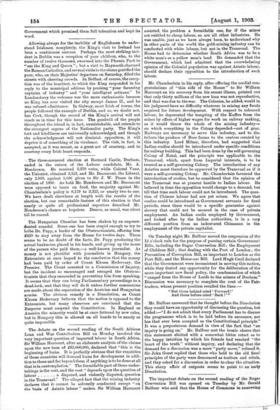Mr. Chamberlain in his reply, after offering the cordial con-
gratulations of "this side of the House" to Sir William Harcourt on his recovery from his recent illness, pointed out that only thirty millions of the new loan was not reproductive, and that was due to the war. The Colonies, he added, would in his judgment have no difficulty whatever in raising any funds required for future development. With respect to coloured labour, he deprecated the tempting of the Kaffirs from the mines by offers of higher wages for work on railway making, as it would throw the whole of the mining industry— on which everything in the Colony depended—out of gear. Railways are necessary to serve this industry, and to dis- tribute the produce of Boer farms to the centres created by this industry. Lord Milner, therefore, had suggested that Indian coolies should be introduced under specific conditions for railway building. This had been done by the self-governing Co:ony of Natal, and the principle was applicable to the Transvaal, which, apart from Imperial interests, is to be treated as a self-governing Colony. The introduction of any Asiatics must therefore be approved by the Transvaal as if it were a self-governing Colony. Mr. Chamberlain' favoured the introduction of coolies, but he considered that the opinion of the Transvaal was at present hostile to Indian labour. He believed in time the opposition would change to a demand, but till that time such labour could not be introduced. The ques- tion of Chinese labour had not yet arisen. We agree that coolies could be introduced as Government servants for fixed periods, since there would be a specific guarantee against slavery that could not be secured in the case of private employment. An Indian coolie employed by Government, and looked after by the Indian authorities, is in a very different position from an indentured Chinaman in the employment of the private capitalist.






































 Previous page
Previous page